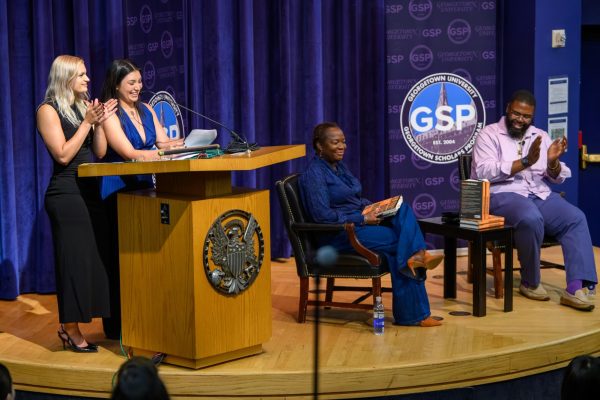The Georgetown Scholars Program (GSP), which supports first-generation and low-income students through mentorship opportunities and financial assistance, is celebrating its 20th anniversary at Georgetown University.
GSP offers students a comprehensive support system from the summer before their freshman year and continues beyond graduation. The program provides peer mentorship, alumni networks, faculty and professional advising, professional development, community bonding, academic support and financial assistance through microgrants.
Brenda Flores (COL ’17), the associate director of GSP, said that the program fosters a community for students who often face difficulties in transitioning to college and who share the experience of being first-generation and low-income. These students often find common ground in their shared identities.
“GSP is a community like no other,” Flores told The Hoya. “On campus, GSP is able to provide a shared space and feeling of belonging, empowerment and accomplishment for the first-generation and low-income community.”
GSP has grown from 200 students when its first cohort graduated in 2009 to more than 650 students in 2024 — creating a graduate network of over 2,000 students. This year, the program welcomed 188 first-years, marking the largest cohort of first-year GSP students in the program’s history.
Serafin Burgulla (CAS ’28), a first-generation student from Bolivia, said GSP helped him acclimate to college life and discover a welcoming community.
“You don’t really have a lot of the knowledge that most people have and you feel kind of lost, especially because it’s a new system, the American system,” Burgulla told The Hoya. “GSP provides the ability for people to share the experiences they’ve had and what they’re learning now, and that really helps you catch up with other people.”
Felix Rice (CAS ’26), the marketing coordinator for the GSP Student Board, which represents GSPers within program leadership and Georgetown as a whole, said the program’s strong sense of community motivated him to join the board.
“GSP 100% feels like my home on campus,” Rice told The Hoya. “That’s where I feel the most in a community. Georgetown can feel very isolating, but I feel like I belong there and that’s what inspired me to get more involved with the board.”

GSP programming includes a 12-week pass/fail course called “Mastering the Hidden Curriculum,” designed specifically for GSP students. The course encourages participants to reflect on their identities and engage in discussions about expanding access to higher education and improving academic support systems.
Burgulla, who is currently enrolled in the class, expressed enthusiasm about connecting with peers and professors in an academic setting where he can explore issues unique to first-generation and low-income students.
“It’s particularly special because I get to see the perceptions of other students who are also low-income or first-generation, and it also gives me the opportunity to see the experiences of professors who have had successful careers,” Burgulla said.
The program also offers a Necessity Fund, a program that covers unexpected expenses through microgrants; Flores said the fund is GSP’s most used resource, with over 90% of GSPers accessing this fund last year, according to Flores.
Jon Plummer (SFS ’27), a GSP member, said the Necessity Fund relieves the burden of everyday costs while attending Georgetown.
“It’s the small things that build up that aren’t necessarily included in the estimated cost of attending Georgetown that GSP helps its students with,” Plummer told The Hoya.
The program also offers students the opportunity to meet with older mentors as they adjust to life on campus.
Vanessa Castro (CAS ’26), a GSP mentor, said she took on the mentorship role because of the strong bond she formed with her own mentor during her first year.
“When I had a mentor in my first year, I loved meeting with her, being able to go on little outings,” Castro told The Hoya. “It’s just nice to have that older student who has more support that they can give you from their learned experiences in their first few years at Georgetown.”
Rice said that GSP students actively engage in various aspects of campus life beyond their involvement in the program.
“They aren’t just GSPers, they’re also students,” Rice said. “They’re in athletics, they’re members of clubs, they work on campus — we’re everywhere on campus. GSP does a really good job of connecting with other parts of campus to make sure that we have the best experience possible.”
Flores said that she has witnessed students thrive both in and out of the classroom through GSP.
“As a student, GSP provided me with invaluable resources as I navigated both my arrival and departure from campus,” Flores said. “As a staff member, the pride and confidence I have gained by seeing my students flourish, by seeing them be loud and proud in their identities, and by seeing the passion they have to advocate for one another and support one another has been a joy.”